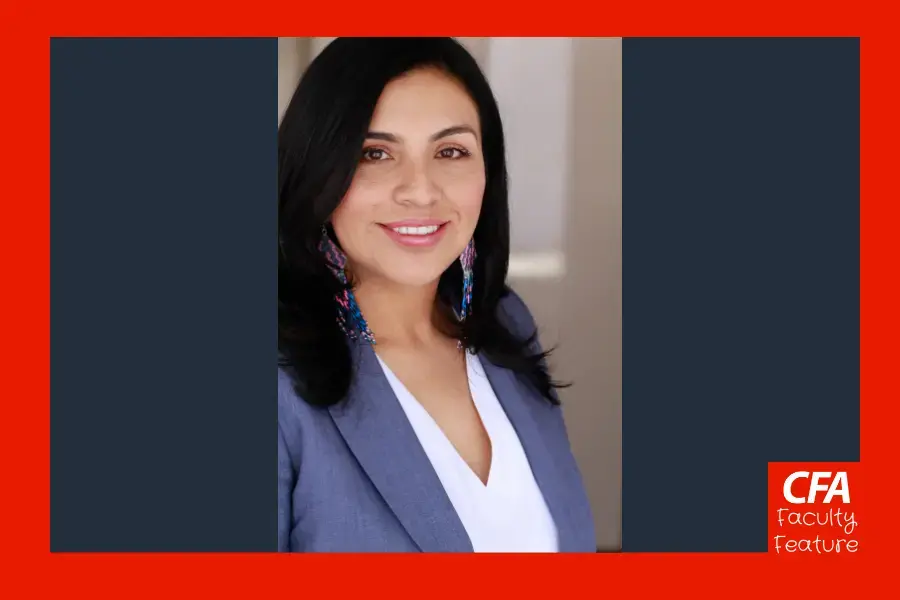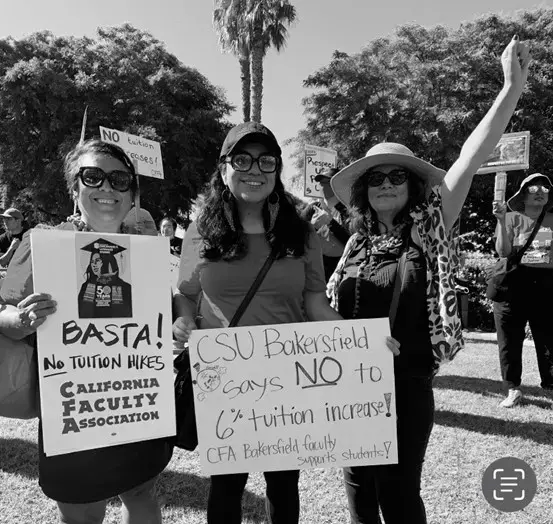Faculty Feature: The Power of Writing and Pedagogy
“When I first tell my students that we’re going to do a significant amount of writing in class, I get a lot of hesitation. Students don’t often see themselves as writers, but I know they have a lot to say. One of the ways I teach Ethnic Studies and advise students is by showing them that our writing can really help shape the world. Our writing has power, and we’re going to write to advocate for ourselves,” said Nora Cisneros, the CFA Bakersfield secretary.

Cisneros just started her new role this fall semester as an assistant professor in the Ethnic Studies Department at CSU Bakersfield, having taught as a lecturer since 2016 at CSU Los Angeles.
Wherever she goes, she attempts to bridge the gap between Ethnic Studies and communities that need it. For her, constructing that bridge is something personal and meaningful, since she grew up in a community that desperately needed it.
“Even though I don’t remember crossing the border, being an immigrant is part of my identity as it is often talked about within my family,” said Cisneros. “I grew up in a predominantly Black and Latinx community, though I never saw these attributes or their importance reflected in my schools’ curriculums.”
“Students are starting to recognize the agency in their work, and they begin to cultivate a responsibility toward one another.”
– Nora Cisneros
“It wasn’t until I took Pan-African Studies and East Asian Studies at East Los Angeles College that I was exposed to many histories that helped me make sense of my own trajectories,” Cisneros recalls. “I was introduced to so many amazing mentors who were women of color, and it helped me recognize my own skills in reading and writing.”
Now at CSU Bakersfield, she offers the same experiences to first-generation students.
“Just like me, many of these students were unfamiliar with Ethnic Studies,” Cisneros said, “but they tend to gravitate towards good pedagogy.”
For that reason, she makes it a point to know the names of each of her students. “I want to know as much about them as I can possibly know,” said Cisneros, “and we also co-construct our classes. The students help shape the syllabus and the readings. They really appreciate knowing that the content is centered around their intellectual pursuits and needs, and it so happens that those needs often reflect marginalized communities.”
Wanting to address those needs, Cisneros has them engage in qualitative research projects that examine the lack of access to food pantries and housing insecurities. Some students also explore available resources for undocumented students on campus.
But the work doesn’t stop at the campus level. Some of her students mapped assets in their community and discovered that there were no Latinx owned bookstores in the area and there were few spaces where parents of students were recognized. Others were inquisitive about Black-owned businesses.
“Students are starting to recognize the agency in their work, and they begin to cultivate a responsibility toward one another,” said Cisneros. “The students are envisioning what they want their community to look like, and they have a desire to create community events and make them more welcoming for their families.” Though the work may begin in the university, she notes that — when done well — it naturally extends outward into the communities and encompasses the grandparents as well as the children.

Much of the work done in and out of her classes involves writing. Reflecting on its value, Cisneros remarks, “Writing can be used as a tool for personal and collective advocacy and liberation. It’s a politically creative art. Writing helps with community formation and introduces students to their student leaders, particularly those that are politically inclined.” By creating this framework for her students, they can then write letters supporting faculty or voice their concerns about the tuition increase and how it might affect prospective students and family members who plan to attend the CSU.
“I want them to know that a fundamental premise of me being there is I really want to help co-create the communities they so desire,” Cisneros said. “We will never shy away from this, because I see my students caring for each other.”
This very same care and compassion were qualities she saw in CFA.
Cisneros explains that her commitments, such as working on her PhD and having very young children, are what motivated her to also get involved with her union.
When she was unable to find affordable childcare or lactation spaces on campus, she reached out to CFA members. She recalled, “Union members helped me find affordable childcare and put in a request to find a lactation space. I don’t think I would have progressed in these ways on my own.”
When Cisneros was offered a tenured-track position at Bakersfield, she didn’t shy away from making it known that she was proud to be a CFA member. “My teaching is inherently tied to labor,” she states. “My work aspires to uplift lecturers and the Latinx community, and I know that CFA will ultimately help me with this project.”
Having been a lecturer for several years, Cisneros is aware of the challenges that many lecturers face. “There are many lecturers who have been here longer than me and whose expertise is far more extensive than my own. They carry our departments, but somehow they don’t have an office, they can’t access funds or course releases, and they aren’t invited to join committees. They are being culturally taxed. Shouldn’t they have a seat at the table?”
Working with CFA members has helped her make these disparities more visible, but she understands that the work being done coalesces in many good ways that advance faculty working conditions.
Reflecting on her own growth and professional development over the past several years, she expressed, “My activism with CFA members has taught me different perspectives and approaches to learning. As a result, I’ve developed in my own thoughts and practices that I now carry into other spaces. What’s important to understand is that we’re all motivated by love for our students, ourselves, and our communities.”
When asked if she keeps in touch with her students at CSU Los Angeles, Cisneros exclaimed, “Of course!”
“Both the undergraduate and graduate students will check in on me,” she said. “The students don’t stop having a relationship with you after the class is over. They learn to keep in touch with professors that care about them. I’m honored to see them grow and even invite them to give presentations at Bakersfield. This is how students give back to the community, and I hope that students at Bakersfield will see that we have a long-term commitment as professors to our students.”
Though she acknowledges that there are real stakes for our faculty and students, she can’t help but spotlight the virtue of teamwork at CSU Bakersfield. “I’m really seeing the love and solidarity that drives this campus and I feel so fortunate to be a part of CFA here,” said Cisneros. “Everyone is committed, and we find joy in our struggle. We know that students are ready to transform their lives, and it’s amazing to be a part of that transformation.”
Join California Faculty Association
Join thousands of instructional faculty, librarians, counselors, and coaches to protect academic freedom, faculty rights, safe workplaces, higher education, student learning, and fight for racial and social justice.